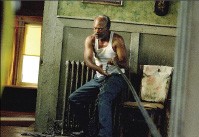When you make a movie about a white “nymphomaniac” chained to the radiator of a black bluesman’s farmhouse, suffuse it with humor, and pitch it as a straightforward entertainment set in a world that sometimes feels as slightly exaggerated as a live-action Disney feature, perhaps you should expect critics to get a little discombobulated.
And so it has been with Craig Brewer’s Black Snake Moan, a bold, brash follow-up to his career-making pimp parable Hustle & Flow.
Early reviews have been as pulpy as the movie itself. The Hollywood Reporter deemed it “so jaw-dropping awful that it might just become a hit.” LA Weekly‘s Scott Foundas was colorfully conflicted: “Few detested Hustle & Flow, with its white-boy fetishization of pimp culture, more than I did, and though I can’t deem Black Snake Moan an advance … it does offer ample proof of Brewer’s facility with the camera, his understanding of Southern culture, and — once you cut through all the bondage and anal penetration — a sweet-natured temperament.”
Most perceptive, though, was an overheated rave from Film Comment‘s Nathan Lee, who dubbed Black Snake Moan “a hardcore exploitation flick that also happens to be the most impassioned spiritual parable in recent memory.” I think that’s about half right, and though Lee gets a little drunk on a Yankee fascination with Southern culture, he’s perceptive in pegging Brewer as making a different kind of movie.
Black Snake Moan is the story of three damaged souls who collide in an evocative rural Mississippi setting: Rae (Christina Ricci) is a young woman whose sexual compulsion is rooted in a history of abuse. Her gentle lamb of a boyfriend, Ronnie (Justin Timberlake), is heading off for National Guard duty but is beset with crippling panic attacks. Farmer and retired bluesman Lazarus (Samuel L. Jackson) has suffered the indignity of watching his wife run off with his brother.
At some point in the movie, as everyone who’s seen a trailer or poster (which means everyone in Memphis) knows, Rae ends up at Lazarus’ house, barely clothed and chained to the radiator.

Samuel L. Jackson’s Lazarus is a chain wielding Good Samaritan out to ‘cure’ a troubled woman of her ‘wickedness.’
But if this conceit, as well as the film’s deliciously garish marketing, fits the “hardcore exploitation” description Lee provides, the movie itself doesn’t. It’s a bit of a fake-out on Brewer’s part, provoking a set of expectations based on the racial and sexual baggage we all carry with us and then delivering something different. And this intentional disconnect extends to the film’s title, which comes from a blues song Lazarus sings during a crucial scene. The words “Black Snake Moan” sound erotic and dangerous, but the phrase is really a metaphor for the internal demons that haunt all three of the film’s principal characters.
Unsurprisingly, a lot of critics seem to be writing from their expectations rather than from the movie itself. Unless I’m misreading a vigorous sex scene between Ricci and rapper David Banner (as small-time hustler Tehronne), there is no “anal penetration” in this movie, as Foundas claims. Nor is Rae a “crack whore” (per Lee) or Lazarus a “sharecropper” (per a positive review on Salon.com).
That doesn’t mean Black Snake Moan isn’t without its titillation. Ricci spends most of the movie in daisy dukes and a T-shirt cut off just below her nipples. By the time she ends up with Lazarus, the daisy dukes have given way to a pair of well-worn white panties, and, in an erotic fever, she wraps the chain around her bare body like a python. Earlier, Rae and a couple of buddies (Memphis actresses Amy LaVere and Clare Grant) play strip football in a pill-induced haze.
But while Brewer never pretends this outré material isn’t meant to be arousing, it also ups the ante on the “impassioned spiritual parable” that Lee correctly identifies. What Black Snake Moan‘s exploitation trappings conceal is essentially a bravely sincere version of the New Testament’s Good Samaritan parable. Lazarus walks out of his house one morning, finds a battered Rae on the road — half-naked, three-quarters wasted, completely alone — and brings her inside for succor. The situation that emerges is absurd, and the film recognizes this, teases out delirious humor, but also stays committed to these characters’ reality. Brewer makes the latent spiritualism of the story explicit in a simple theological discussion between Rae and Lazarus’ friend Reverend R.L. (veteran TV actor John Cothran). If Luis Buñuel had been an iconoclastic Christian rather than an atheist, this is a movie he might have come up with.
Once the chain comes out, some viewers may struggle to take this scenario as seriously as Brewer, especially since he so readily allows his audience to laugh at what’s happening on-screen. But Brewer, as Lee suggests, is making a new kind of movie, one that borrows from the established templates of contemporary Hollywood popcorn movies, regional indie cinema, and the retro-exploitation style of Quentin Tarantino and his imitators, but it also departs from each in crucial ways.
Black Snake Moan, like Hustle & Flow before it, shares the pulpiness and movie-madness of the Tarantino school but has more sincerity, less ironic distance. It shares the crowd-pleasing instincts of a mass-marketed studio movie but with a storytelling integrity those movies now tend to lack. The modest budget and regional specificity is in line with “indie” cinema, but Brewer’s insistence on imbuing his ostensibly “gritty” situations with a movie-movie vibrancy flaunts convention.

Craig Brewer
Instead, these movies echo the under-rated “working-class cinema” (in Brewer’s view) of ’80s movies such as Purple Rain or Footloose — working class not just in terms of what the movies are about but how the movies connect, which is directly.
The accessibility of Brewer’s movies stems in part from his fluency with actors, and he gets engaging, convincing performances here from all three leads. I couldn’t quite buy Rae’s erotic fits — writhing in the grass, uncontrollable, insatiable — but this is otherwise a fearless, compelling performance from Ricci, probably the best of her career. As Lazarus, Jackson delivers a few of the charismatic, crowd-pleasing line readings that are his trademark, but he also gets to act. Drawing on area blues icons such as Junior Kimbrough, R.L. Burnside, and Big Jack Johnson to construct his look — graying, unkempt, with an inelegant, hunched-over gait — Jackson disappears into the role as fully as he has since maybe Jungle Fever. And Timberlake is completely stripped of his pop-star magnetism as Ronnie, reduced, effectively, to the boyishness at the core of his persona.
Around this nucleus, Brewer builds a rich cosmology of supporting characters, from such deeply likable normals as Reverend R.L. and pharmacist Angela (Law & Order‘s S. Epatha Merkerson) to colorful locals such as Claude Phillips (as juke-joint proprietor Bojo), who, following his scene-stealing bit as a tweaker Casio salesman in Hustle & Flow, is looking like the kind of classic bit player that populated the movies of directors such as John Ford, Howard Hawks, and Preston Sturges.
Even if you buy into Brewer’s vision, Black Snake Moan isn’t without its flaws. Some non-actors deliver awkward line readings (particularly Banner), and the movie doesn’t sweep you up moment by moment the way Hustle & Flow did during its terrific recording sequences, though there are times when it comes close, such as Jackson performing “Stagger Lee” at a packed juke joint. And Brewer struggles to visualize the past abuse at the root of Rae’s sexual compulsion, coming up with a blurry, nightmarish fever dream that literalizes her fears in an overly familiar way.
But, ultimately, Black Snake Moan is the better film — not necessarily more personal (because Hustle & Flow was plenty personal), but more intimate and more deeply felt. This gets back to the spiritual parable at the movie’s core. The exploitation iconography isn’t the only intentionally misleading aspect to Black Snake Moan. Not only is Lazarus not chaining Rae to his radiator for sex, as the marketing teases. He’s also not about to “heal” her, as he initially believes.
With Bible in hand, Lazarus tells Rae that he aims to “cure” her of her “wickedness,” but, crucially, Black Snake Moan never quite endorses this goal, and Laz abandons it, realizing it’s not his place to “judge” or “cure” but merely to care.
Despite its surfaces, Black Snake Moan is suffused with tenderness. Its finest moment is the juxtaposition of a sweetly sung hymn and a desperate confrontation. It is book-ended by trembling embraces. The first is all bare skin and sunlight. In a movie where most sexual activity is destructive, Brewer opens with as healthy and righteous and erotic a sex scene as you’ll see on the big screen this year. The last is even more intimate and suggests there is no “healed” in this movie’s universe. Pain and temptation and need are ever-present, but people can cling to each other to get through.
Black Snake Moan
Opening Friday, March 2nd
Multiple locations